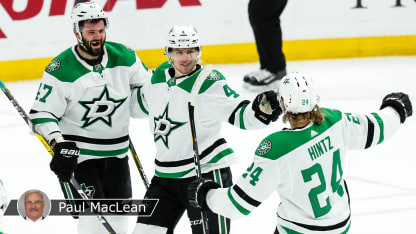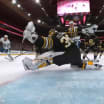It seems to me that Dallas is deliberately trying to delay things out there and not let the Blues get the flow they're looking for.
In the first period alone, they iced the puck eight times. Any time the puck was in the Dallas end and there was any kind of opportunity for St. Louis to extend shifts and make it difficult for the Stars, they'd just shoot it down the ice, relieve the pressure and take their chances in the face-off circle.
From a Dallas standpoint, sure, they don't get their line change. But at least they were bringing the game down to a crawl and it seemed to have an effect on the Blues in Game 2.
To me, it kept the Blues from getting into their tempo and their pace game. The Stars brought the game down to a crawl and the Blues couldn't counter it. The result: There were tons and tons of face-offs, and the Stars were fine with that en route to a 4-2 victory.
This, to me, is a tactic the Stars have used successfully in the past. They'll take their chances in the face-off circle. And they'll find ways to delay the ensuing face-offs. It goes from 30 seconds to 35, 40, you get the idea. Then you see Stars goalie Ben Bishop over at the bench fixing his skate.
There are different ways they find to slow things down. And it really disrupts the rhythm of the opposition, which is all revved up to get going. Instead it gets face-off after face-off after face-off.
A team like St. Louis, the way they're playing right now, they implement a high-end forecheck that gets them on top of people. Constantly lining up for draws keeps them from doing that.
What interests me, from a coaching standpoint, is what Dallas coach Jim Montgomery will do heading into Game 3 at American Airlines Center on Monday (8 p.m. ET; NBCSN, TVAS, SN). The best-of-7 series is tied 1-1.
Montgomery will have the final change. That gives him the opportunity to dictate the pace of the game through favorable matchups.
Another way the Stars have been able to disrupt the Blues' flow is their captain, Jamie Benn.
This is a guy that has the unique combination of skill and sandpaper. He didn't necessarily have his skating legs in Game 2, but he was at his ornery best. At one point he got into a scrum with Blues sniper Vladimir Tarasenko, which led to coincidental minor penalties. Tarasenko showed flashes the rest of the way but he lacked consistency the remainder of the game after being engaged with Benn.
Benn's actions reminded me of another captain whose team is still in the playoffs, Zdeno Chara of the Boston Bruins. Columbus Blue Jackets forward Riley Nash had delivered a hit in Game 1 of the Eastern Conference Second Round that had left Bruins forward David Krejci questionable for Game 2. Sure enough, come Game 2, Chara, in his first opportunity, buried Smith.
Message sent, message received. The captain has spoken.
By the way, Krejci was able to play in Game 2.
The Benns, the Charas, they know the intricacies of the game. In the case of Benn, it proved to be yet another effective tactic in evening the series against the Blues 1-1.
Will the Stars continue to try to slow things down? If so, how will the Blues counteract? Or will Dallas try to speed things up in order to change up things?
As a coach, these are the nuances that make this such a fascinating time of year.


















